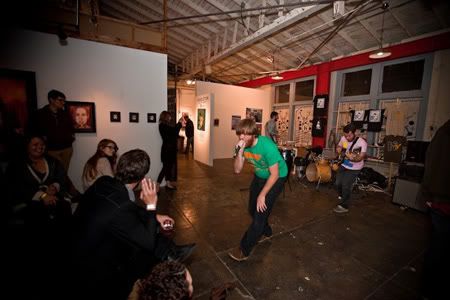
Some of my friends and family thought it strange that, at age 30, I decided to start an old school, hard-core punk band. Punk, it is commonly thought, is a genre of the young—angry teenagers rebelling against their parents, against school, and whatnot. Also, I am a pretty mild-mannered guy. I like Simon and Garfunkel, the Beach Boys, Belle and Sebastian. I was never really a “punk” kind of a guy. Once, in high school, my friend Matt played me a Dead Kennedys album and, frankly, I couldn’t relate. All that anger, that frantic, abrasive sound. Who would want to voluntarily listen to that? Not me. But something happened around age 30, actually a lot of somethings, that plunged me deep into a genre I had avoided like I avoided horror films.
I started hanging out at The Continental Room (hands down the coolest bar in Fullerton), where DJs would play old school punk records—bands like Stiff Little Fingers, The Misfits, The Cramps, The Dead Kennedys. Plus, local punk bands would play there—not washed-up drug addicts—but young, cool kids in bands with names like The Audacity, Death Hymn #9, The Cosmonauts, and Cum Stain. A lot of these bands are on Fullerton’s own Burger Records label (hands down the coolest record label in Orange County). The music was wild and abrasive and frantic and, frankly, exhilarating. There I was, a 30-year-old English teacher, finally “getting” punk music. It was as if a curtain had been rolled back, and I was astonished.
So I dove in head-first, loading my ipod up with both old school and new school punk. It was an education, and my teacher was Casey, a DJ from The Continental Room, a college dropout who could easily teach a graduate-level seminar on garage, punk, and soul music. I began with the classics: The Clash, Dead Kennedys, Sex Pistols, The Ramones, and then moved on to the more obscure (or, at least, obscure to me)—Cock Sparrer, The Gun Club, X, Flux of Pink Indians, The Screamers, The Germs, The Weirdos, and on and on and on. There is so much amazing underground punk music that it is literally impossible to know it all. I absorbed this music like a sponge.
So what was the appeal of punk? For me, good punk is about things. In the 60s, music was about things that mattered. Artists like Bob Dylan, Joan Baez, and Pete Seeger used music as protest and inspired social change. After the 60s, music that meant things seemed to go away, and was almost thoroughly replaced by mindless pop. Or so I thought.
When I discovered underground punk, I was like “Aha! This music is actually about stuff!” The Dead Kennedys, The Clash, and a host of other underground punks, used their music to speak against injustice, against war, against oppression. It was loud and abrasive because they were angry, they were outraged, and they wanted to change the world. It was art as protest, against Reagan—era economics, against religious hypocrisy, against American imperialism. The Dead Kennedys were Bob Dylan on steroids.
Don’t get me wrong. Not all punk music was serious. Some of it was downright silly, even gross. GG Allin is a good example of “gross-out” punk. But even the silly and gross stuff seemed meaningful. It was part of a lifestyle of rebellion, of saying “fuck you” to corporate pop culture sameness, and making a culture of freedom and unfettered expression.
So I found myself dusting off my old electric guitar and starting to write music again. When I was younger, in high school, I always had great difficulty writing songs. I was beset by perfectionism, which led to constant frustration and “writer’s block.” Punk music set me free, creatively. I could write a song with three or four chords, played super fast. I could write about the things in the world that made me angry—corporate greed, health care, mega-churches. I found myself writing lots of songs. It was cathartic and fun.
I convinced a couple friends to start a punk band with me: my roommate Landon borrowed a bass guitar from a friend, my friend Christie (who had never played drums before), bought a drum set. We started practicing once a week in my apartment. We called ourselves Chicken or Fish. At first, we were terrible. But we kept practicing, writing songs that were angry and funny and fast and sloppy. After a few months of practicing, I convinced my friends at The Continental Room to let us play a show. It was one of the most exhilarating experiences of my life. We have been together for over a year now, we still practice every week, play a couple shows a month, and we just self-released our first EP. None of us have quit our day jobs. That’s not why we do it. We do it because it is cathartic and fun. We do it because we love it. We do it because we still believe music can be meaningful.
I think punk music, and the punk mindset, has a lot to say to this generation, to this time and place in modern America. The economy sucks. We are involved in three wars. Corporations have most of the power. Politicians suck. Punk rock still speaks to these horrors, speaks truth to power, gets angry at injustice, beckons us to question authority, to rebel, to not accept things as they are, to make our voices heard, to do it ourselves, to be badasses.
Is punk dead? Hell no.
